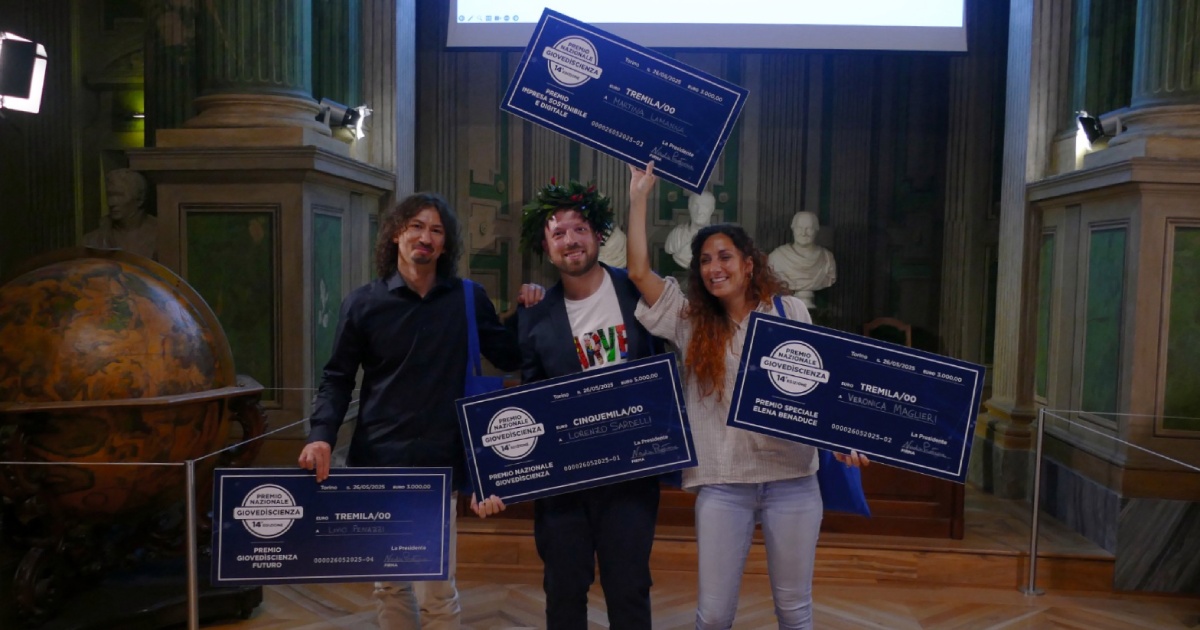On the afternoon of Monday, May 26, 2025, at the Academy of Sciences in Turin, the winners of the fourteenth edition of the Premio Nazionale GiovedìScienza (GiovedìScienza National Prize), were announced. The scientific competition was aimed at researchers under 35 from all Italian research institutions, organized by the Turin-based association CentroScienza Onlus and promoted in collaboration with I3P with the aim of promoting and encouraging research protagonists in the communication of science.
Premio Nazionale GiovedìScienza was established in 2011, in fact, to encourage leading players in this field to offer them resources and tools to disseminate their research. Its fourteen editions attracted more than 850 applications and involved 461 female researchers and 395 male researchers. There were 86 applications received for the 2025 edition, from 54 female researchers and 32 male researchers: 136 referees evaluated the candidates and selected the shortlist of ten finalists based on scientific merit.
The overall winners
Researcher Lorenzo Sardelli of the University of Turin won the first prize worth €5,000 with research titled “La scuola per supereroi del timo umano” (“The Human Thymus Superhero School”). Inspired by nature as the ultimate expression of bioengineering, in his research work Lorenzo studied the mechanical and functional properties of biological tissues and structures to design advanced materials that mimic their behavior in a precise and controllable way in the laboratory.
Through chemical and structural engineering of biomaterials, today Sardelli develops innovative solutions to address crucial challenges in regenerative medicine, targeted drug delivery, and the creation of artificial tissue models. His work focuses particularly on the treatment of infections and diseases related to aging immune organs, with a focus on the thymus and the cells that characterize its function.
The runner-up was Chiara Anzolini, from the University of Padua, with research titled “Messaggeri dalle profondità della Terra” (“Messengers from the Depths of the Earth”). Third place was awarded to Lorenzo Pizzuti, from the University of Milano-Bicocca, with a project titled “Le meraviglie dell’universo oscuro” (“The Wonders of the Dark Universe”).
The special prizes
Three other cash prizes, worth €3,000 each, were also awarded:
- the Elena Benaduce Special Prize, reserved for research work that stands out for its impact on people's well-being and quality of life and awarded by the Popular Jury, went to Veronica Maglieri, from the University of Pisa, for her research “Ridere è una cosa seria” (“Laughing is a Serious Thing”), which studies the facial expressions and contagious behaviors of dogs, wolves, primates and other animals to understand the evolution of certain communicative behaviors among different species.
- The GiovedìScienza Future Prize, awarded to the best feasibility study, was won by Livio Penazzi, from the University of Turin. His research paper, titled “Un futuro sostenibile per il pet food” (“A Sustainable Future for Pet Food”), analyzes the use of alternative proteins derived from insects and lentil paste waste, demonstrating advantages in terms of digestibility and metabolic benefits for dogs, and offering a concrete prospect for reducing the environmental impact of the pet food supply chain.
- The GiovedìScienza Sustainable and Digital Enterprise Prize, awarded to those who have developed a project proposal starting from the concept of “Double Transition” and the themes of sustainability and digitization, was won by Martina Lamanna of the University of Bologna with the project “MOOve: il futuro della zootecnia intelligente” (“MOOve: the future of intelligent animal husbandry”). The project introduces a smart collar for dairy cattle that uses sensors and artificial intelligence to monitor feeding, rumination and movement, preventing health problems, reducing drug use and improving feed efficiency.
The 10 finalists and Special Award winners will have the opportunity to participate in a training course dedicated to science communication and from this year they will also have the opportunity to participate in “Arte Oratoria”, a public speaking training course.
“The ability to tell the story of science in a clear, accessible and engaging way is a key element in enhancing the role of research in our society,” commented Giuseppe Scellato, President of I3P. "Today, more than ever, it is necessary to make visible the connections between scientific research, technological innovation and social impact: effective storytelling of these links can strengthen the dialogue between science and citizens, stimulate the birth of new businesses and nurture a shared culture of innovation. Supporting initiatives such as Premio Nazionale GiovedìScienza means investing in the future, promoting skills, ideas and visions that contribute to the progress of the country, which is precisely why the I3P incubator was pleased to be part of it again this year."

